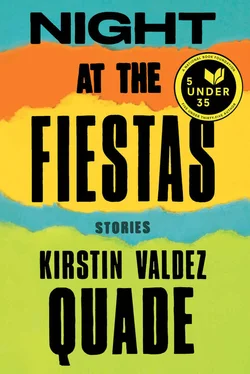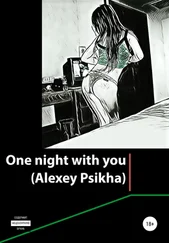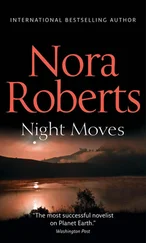I CAN FEEL THE OJO in my bones, which ache in the morning and at night, and in my skin, which is prickly and electric. Growing pains, the doctor at the clinic tells me. Still, I must put my affairs in order. First, there is the problem of the land. When I’m gone it will go to the distant offspring of a cousin of my grandfather’s. My grandfather doesn’t know I know this, doesn’t know I won’t have children of my own.
I have toys and books that must be disposed of, too. A collection of stones.
THE OLD WOMEN SAY the ojo is caused by a covetous glance, by looking overlong. The man who gave it did not admire me, however, and looked for only a moment. The one thing of mine he desired, he took.
These are the symptoms: At night heaviness crouches on my chest and I wake gasping for air. Occasionally my eyes blur for no reason and Cuipas slants and washes away. At my worst, I shiver and burn, and my grandfather wraps my feet in cold rags.
My memories of my mother are insubstantial. I see her lying on her back on the living room floor, a beauty magazine held above her head as she reads, limp pages rustling. Holding me in the yard at night, bare feet, my hand gripping the flannel nightgown at her breast as I follow with my eyes her pointed finger to the moon. A dish of yogurt cracked on the board floors of the kitchen, my mother crying. I do not know if my grandfather remembers these moments, but he must remember others: my mother as a laughing toddler, perhaps, my mother at her first communion, my mother too young and pregnant with me. Possibly he remembers the sound of her voice.
ONCE A MONTH we drive west to Albuquerque, once a week we drive east to Estancia. In Estancia we buy groceries and the newspaper. At home my grandfather prepares our favorite lunch: cheese and mustard sandwiches and a glass of milk. We wash our dishes, and then it is time for the paper. We turn to the back, to the comics, but we don’t read them. Very carefully my grandfather tears out the puzzles, the spot-the-differences for me, the word search for him.
We sit, working with our pencils.
“These are good for my eyes,” he tells me. “They keep my mind sharp.”
His favorites are the ones that match English and Spanish words. Sometimes my grandfather disagrees with the paper’s translation. “ Moths are palomitas, ” he tells me, “not polillas, ” and I look up, try to remember. When I finish my puzzle, I stand beside my grandfather’s chair and point out words he’s missed.
At night, if I can’t sleep, I creep to the kitchen and take the paper from the crate by the woodstove. I spread it on the bedclothes. Somewhere north of here they are building a new casino. They are angry about the economy. In a country far away something has changed. I lie back on my pillow and try to imagine living in the world where these things matter. In the morning, when my grandfather wakes me for my oatmeal, he gathers the paper and replaces it beside the stove.
Sometimes my grandfather remembers church, and if it is Sunday, he shakes me awake and braids my hair, and we walk to the chapel. We sit in the pews with our neighbors and try to listen. The priest talks about the soul, as beside me my grandfather’s chin sinks to his chest. The soul is a ball of light or a jewel that must be treasured, given to Jesus.
“Christ calls for our souls though we are foul in body,” says the priest.
Jesus looks down on us from the cross, mournful and distant and preoccupied with his own story.
I feel my soul inside me, made of thin, pale paper, fragile as a Japanese lantern, resting above my heart. I move with care and take shallow breaths so as not to crush it.
Christ’s frozen eyes gaze at the ground. He declines to see my sleeping grandfather; He declines to see what He has abandoned. Rage rises in my chest, threatening to crumple my soul. Christ has no time for Cuipas, no time for my grandfather.
“Peace be with you,” the priest says, and my grandfather wakes, squeezes my hand.
I HAVE NEVER SEEN a Japanese lantern, only read about them in my mother’s novels. Used chiefly at night parties, they sway from strings above wide lawns, while music plays and women in backless gowns sip champagne.
MY GRANDFATHER OWNS nine vehicles, several of which run, though none are insured. When we go to Albuquerque, he lets me choose the car. Usually, I pick the old blue truck or the heavy brown ancient Mercedes with the rat’s nest in the heating vent, which a man up north gave my grandfather as payment for a stone fireplace in his guesthouse. These are cars my mother will recognize.
Together my grandfather and I walk behind the house, where the vehicles sit, some with cracked tires, some parked on blocks. I hear him breathe beside me, even and smooth, familiar.
Today I pick the Mercedes.
In the car, we roll down the stiff windows and trail our hands in the air outside. Along the road the yellow grass sifts the wind.
When my grandfather begins to talk, it isn’t about the past but about a future in the world outside Cuipas.
“You must not be shy,” he tells me.
“You must be happy and laugh.”
“You must talk to strangers.”
I nod and tell him, “I will, I’ll try,” and panic rises in me.
“This is no place for a young person,” my grandfather says. I know he thinks of a day — a day that will never exist but that is as real to him as if it already did — when I will shoulder a bag and climb up and over the Manzanos without turning back. He says again, “This is no place for a child.”
I want to make him take it back. Instead, I pull the slip of paper from my pocket. “I want to stop here,” I say firmly. “I need to stop at this clinic.”
He takes the slip from my hand and frowns at it. I nearly grab the wheel, but his one hand is steady and the road is straight. He lifts his foot from the pedal and the car loses power. He turns to look at me for a moment, then turns back to the road. He folds the slip of paper, tucks it into his breast pocket, and gives the car gas.
“So can we? Can we stop?”
“No,” he says, in a voice he rarely uses with me, a voice that is harsh and foreign and final. The ojo stirs and my vision smears. I think of my mother. I’ll never leave my grandfather, but it isn’t even my loyalty he wants.
The road twists and curves and begins to rise. When we are in the Manzanos, I swallow the stone in my throat, look out over the piñon, imagine the murderer in these mountains, alone with the knowledge of his crime.
IN THE CITY, the bright billboards flash along the highway, and white sun glints off the windows of the tall hospitals and hotels. As the fast cars pass, I look for my mother. I don’t think she will be in the driver’s seat of one of the fancy cars, but I watch the faces anyway. Her hair could be different by now. Other things might be different for her, too, I know, because in the world people’s fortunes rise and fall.
If I find her, I think, then my grandfather will see the doctor. He will see the doctor and he will be cured and together we will bring my mother home.
I wonder if he is looking as well. He gives no indication, keeps both hands on the steering wheel. It’s harder for him to drive now, and the traffic makes him nervous.
“Look, hijita,” he tells me before we shift lanes. His voice is familiar again. “Am I clear?” And I crane my neck, watch the cars coming at us, tell him yes.
At the Kmart we load our cart with things we will need for the next month: tubes of toothpaste, large packages of paper towels, corn flakes, sometimes new sneakers for me, undershirts for him. My grandfather buys me toys also, plastic dolls, characters from films and television shows I have never seen. He will ask me to open the toys in the car, and I will scatter the bright plastic packaging on the floorboard. As he drops the toys into the cart, I smile and exclaim, though I’m too old for them and wish he would save our money. At home I will line them up on the windowsill in my room, leave a few scattered on the floor, so my grandfather, walking by, will think I have been playing.
Читать дальше












